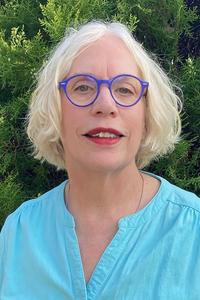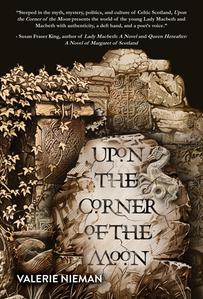
|
|
| photo: A.L. Sirois | |
Valerie Nieman spent weeks solo hiking in Scotland to research Upon the Corner of the Moon (Regal House Publishing, March 11, 2025), the story of the young Macbeths. The follow-up, The Last Highland King, in which these rulers unite Scotland in the 11th century, will be published in 2027. Nieman is the author of six other novels, including the Sir Walter Raleigh Award-winning In the Lonely Backwater, a short fiction collection, and three poetry books. A graduate of West Virginia University and Queens University of Charlotte, Nieman was a journalist in West Virginia and a college professor in North Carolina. When not writing or walking or reading, she enjoys fly fishing.
Handsell readers your book in 25 words or less:
The Macbeths you've never known: destined to unite Scotland, they first had to survive as pawns in a dynastic struggle.
On your nightstand now:
H Is for Hawk by Helen Macdonald. Like her, I was a girl who drew hawks and horses, fell down a lot, and read omnivorously. When my mother passed and then my father, I found solace on hiking trails and midstream in trout waters. This book brought back the grief and the healing--and reacquainted me with T.H. White whose The Once and Future King entranced me long ago.
The Birth of Tragedy by Friedrich Nietzsche, because I like something light at bedtime.
All Hallows' Eve by Charles Williams, whose work crosses many boundaries, plus you can't ignore an introduction by T.S. Eliot.
Whish: Poems by Jackie Craven.
Favorite book when you were a child:
Apart from everything about horses, I remember two: Alice's Adventures in Wonderland by Lewis Carroll, and a book of Jack London stories that I plucked off a display meant for older readers during a school book fair. Oh, and all those Little Golden Guides and then Peterson Field Guides--birds, butterflies, rocks, stars, trees, etc.
Your top five authors:
Whatever book I'm currently reading--no, really, I have such a hard time with this as I read all over the place, but just from the top of my head, Margaret Atwood, Hilary Mantel, Edgar Allan Poe, Fred Chappell, Robert Macfarlane.
Book you've faked reading:
I don't think I've ever faked reading a book. I dipped into Harry Potter and found it wasn't for me, but I have enough familiarity from the omnipresent media that I can be part of a discussion. I have, however, more than once implied that I have already read a book by a friend when it is still on my To Be Read stacks, otherwise known as the floor of my office. I cannot keep up!
 Book you're an evangelist for:
Book you're an evangelist for:
Indigo Field by Marjorie Hudson, because it's a Southern book by a non-Southerner, and deals with issues of race and class and belonging while being magnificently readable.
Book you've bought for the cover:
Oh, I'm a sucker for a beautiful binding, especially those Victorian, Art Nouveau, and Glasgow Style wonders created for cloth-and-paperboard popular editions. Did you know that many of those gorgeous covers were created by women? Here's a link to an exhibit focusing on Margaret Armstrong's work. For a single book, a fairly recent book, I think Get in Trouble by Kelly Link really drew me in.
Book you hid from your parents:
None. My parents were extraordinary. Although not college educated, they encouraged my reading and never put up any barriers. When I picked up a paperback copy of D.H. Lawrence's Lady Chatterley's Lover from my uncle's yard sale, he was scarlet with embarrassment and refused to take my quarter. My father intervened: "If she wants to read it, and she can read it, then she can buy it." I was at the time a "tween." I still have that worn book, a memory of unwavering parental support that led directly, I think, to my becoming a writer.
Book that changed your life:
The Left Hand of Darkness by Ursula K. Le Guin. Along with The Illustrated Man by Ray Bradbury and Walter Miller's A Canticle for Leibowitz, it was my introduction one hot teenage summer to the wonders of speculative fiction.
Favorite line from a book:
Oh, this is torturous, as whole books rise up in my memory, but remembering a single line? "It was a pleasure to burn." --Ray Bradbury, Fahrenheit 451
Five books you'll never part with:
The John Ciardi translation of Dante's The Divine Comedy, which brought the poetry to new life in English.
Candide by Voltaire, my introduction to the great thinker in high school French class.
The White Goddess by Robert Graves, because of its intricate exploration of language and myth.
Adversaria by Timothy Russell, which has poems delicate as a Chinese painting but set in the apocalyptic landscape of an Ohio Valley steel mill town.
Norton Anthology of World Literature (hey, that's cheating!)
And one I let get away, my annotated Riverside Shakespeare--because that person needed it more.
Book you most want to read again for the first time:
Dune by Frank Herbert, because I was absolutely immersed in a world where a planet's ecology was addressed.
Why Macbeth?
Among the out-of-my-age-group books I devoured at home was Tales from Shakespeare by Charles and Mary Lamb. Macbeth was my favorite, which led to my father taking me to see a traveling production that came to our rural Appalachian region when I was in junior high. I was hooked forever. Then, while doing research for another book, I learned that the entire story was inside-out, and that Macbeth was a rightful king who ruled well for 17 years. Of his queen, Gruach, we know little more than her name. I would be haunted by this for decades, beginning my research in the 1990s with interlibrary loan books, then on through the arrival of the Internet and two month-long trips to Scotland, where I wandered among ancient stones and got a library card from the National Library of Scotland so that I could access rare volumes and work in the reading room. What book lover wouldn't geek out at that?

